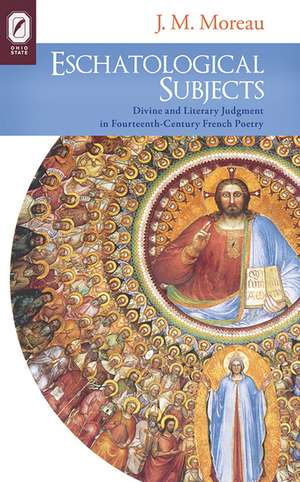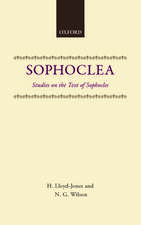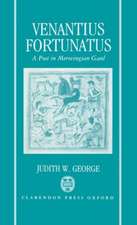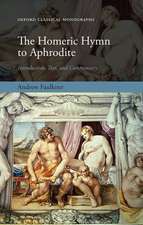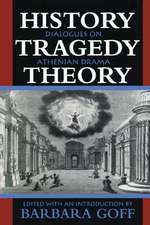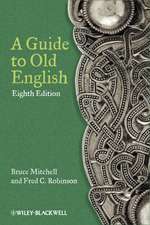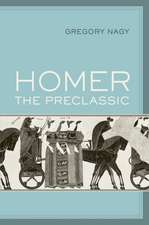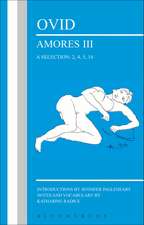Eschatological Subjects: Divine and Literary Judgment in Fourteenth-Century French Poetry: Interventions: New Studies Medieval Cult
Autor J. M. Moreauen Limba Engleză Paperback – 31 mai 2016
Eschatological Subjects: Divine and Literary Judgment in Fourteenth-Century French Poetry takes an innovative approach to medieval eschatology by examining how poets cast themselves in the scene of judgment as defendants summoned to answer to the Almighty for the sins of their writing. Since medieval Europeans lived in perpetual anxiety of divine judgment, constantly surrounded by reminders in art and literature, author J. M. Moreau shows that this is a natural extension of medieval life.
But Eschatological Subjects goes even further to demonstrate the largely unrecognized duality of this judge figure: not just God, the judge is also the imperious and imperfect human reader. The simultaneous divine and human judgments in (and of) French poetry reveal much about the ethical stakes of writing vernacular poetry in the later Middle Ages and, most importantly, about the relationships between authors and audiences.
Focusing on Guillaume de Deguileville, Guillaume de Machaut, and Jean Froissart (each of whom composed scenes in which they appear on trial before God), Moreau contributes important new insights on the complex “trial process” of later medieval literature, in which poetic authority and fame depended on the poet’s ability to defend himself before a fearful court of reader opinion.
But Eschatological Subjects goes even further to demonstrate the largely unrecognized duality of this judge figure: not just God, the judge is also the imperious and imperfect human reader. The simultaneous divine and human judgments in (and of) French poetry reveal much about the ethical stakes of writing vernacular poetry in the later Middle Ages and, most importantly, about the relationships between authors and audiences.
Focusing on Guillaume de Deguileville, Guillaume de Machaut, and Jean Froissart (each of whom composed scenes in which they appear on trial before God), Moreau contributes important new insights on the complex “trial process” of later medieval literature, in which poetic authority and fame depended on the poet’s ability to defend himself before a fearful court of reader opinion.
Preț: 325.17 lei
Nou
Puncte Express: 488
Preț estimativ în valută:
62.24€ • 67.63$ • 52.32£
62.24€ • 67.63$ • 52.32£
Carte tipărită la comandă
Livrare economică 16-22 aprilie
Preluare comenzi: 021 569.72.76
Specificații
ISBN-13: 9780814253007
ISBN-10: 0814253008
Pagini: 248
Dimensiuni: 152 x 229 x 18 mm
Greutate: 0.37 kg
Ediția:1
Editura: Ohio State University Press
Colecția Ohio State University Press
Seria Interventions: New Studies Medieval Cult
ISBN-10: 0814253008
Pagini: 248
Dimensiuni: 152 x 229 x 18 mm
Greutate: 0.37 kg
Ediția:1
Editura: Ohio State University Press
Colecția Ohio State University Press
Seria Interventions: New Studies Medieval Cult
Recenzii
“Eschatological Subjects proposes a fresh and innovative take on the fourteenth-century nature of authorship and manuscript production. This is a mature and articulate work of scholarship.” —Zrinka Stahuljak, University of California, Los Angeles
“Eschatological Subjects provides a fresh, persuasive, and informed assessment of judgment poetry that moves well beyond the limits of recent studies of this genre. Moreau reveals that judgment poems were not simply playful pieces intended as light entertainment for court culture; instead, these texts reveal the deep ethical concerns experienced by authors who recognized that judgment of their writing by readers was both inescapable and morally significant. It is a refreshing and thoughtful take on issues that have dominated francophone medieval studies.” —Deborah McGrady, University of Virginia
Notă biografică
J. M. Moreau was a Mellon Postdoctoral Fellow of French Studies and Comparative Literature at Brown University. He is now an independent scholar.
Cuprins
IntroductIon
Literature as Eschatological Scene
I. La scène judiciaire: Big and Little Judges
II. The Eschatological Procès
III. Scope of the Book and Chapter Outline
Chapter 1
Representation in Heaven: the Thirteenth- and Fourteenth-Century Rhetor Divinus
I. Quid sum miser tunc dicturus?
II. From Legal Subject to Eschatological Subject
III. Human Rights and the Devil’s Rights: The Virgin’s Divine Advocacy
IV. Divine Rhetoric in Action: The Puys
Chapter 2
A Particular Judgment: The Case of Deguileville’s Pèlerinage de l’âme
I. Introduction
II. Des ouvrages quë il a fait: The First Two Pèlerinages
III. Preliminary Judgments
IV. Satan v. Guillermus de Deguilevilla
Chapter 3
Post-Apocalyptic Judgment: Machaut’s Jugement dou roy de Navarre
I. Introduction
II. The Judgment of the Living and the Dead
III. Bonneurté’s Case and Guillaume’s Livres
IV. Judgment in the Court of Charles de Navarre
Chapter 4
The Judgment of Jupiter: Froissart’s Joli buisson de Jonece
I. Introduction
II. Froissart’s Judgment of Paris, or a Portrait of the Artist as a Young Machaut
III. God’s Capital, Venus’s Gifts, and the Judgment of the Patron
IV. Recollection and Redemption in Froissart’s “Lay de Nostre Dame”
Conclusion
In Lieu of a Last Judgment: Beyond the Fourteenth Century
Literature as Eschatological Scene
I. La scène judiciaire: Big and Little Judges
II. The Eschatological Procès
III. Scope of the Book and Chapter Outline
Chapter 1
Representation in Heaven: the Thirteenth- and Fourteenth-Century Rhetor Divinus
I. Quid sum miser tunc dicturus?
II. From Legal Subject to Eschatological Subject
III. Human Rights and the Devil’s Rights: The Virgin’s Divine Advocacy
IV. Divine Rhetoric in Action: The Puys
Chapter 2
A Particular Judgment: The Case of Deguileville’s Pèlerinage de l’âme
I. Introduction
II. Des ouvrages quë il a fait: The First Two Pèlerinages
III. Preliminary Judgments
IV. Satan v. Guillermus de Deguilevilla
Chapter 3
Post-Apocalyptic Judgment: Machaut’s Jugement dou roy de Navarre
I. Introduction
II. The Judgment of the Living and the Dead
III. Bonneurté’s Case and Guillaume’s Livres
IV. Judgment in the Court of Charles de Navarre
Chapter 4
The Judgment of Jupiter: Froissart’s Joli buisson de Jonece
I. Introduction
II. Froissart’s Judgment of Paris, or a Portrait of the Artist as a Young Machaut
III. God’s Capital, Venus’s Gifts, and the Judgment of the Patron
IV. Recollection and Redemption in Froissart’s “Lay de Nostre Dame”
Conclusion
In Lieu of a Last Judgment: Beyond the Fourteenth Century
Descriere
Examining how poets cast themselves in the scene of judgment as defendants summoned to answer to the Almighty for the sins of their writing.
